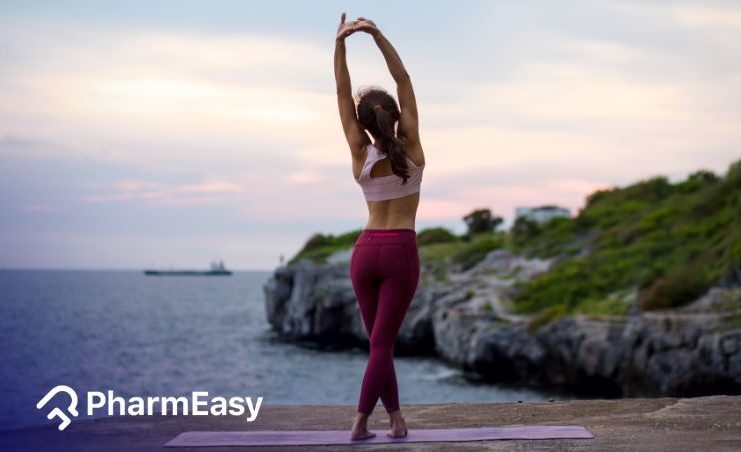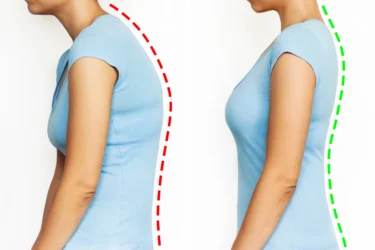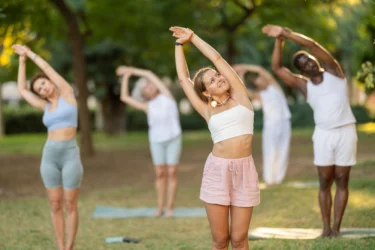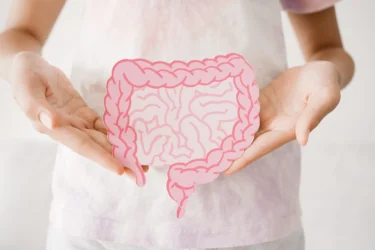Benefits of Tiryaka Tadasana (Swaying Palm Tree Pose) and How to Do it By Dr. Himani Bisht
By Dr. Himani Bisht +2 more

Get,

to manage your symptom
Get your,


4 Cr+ families
benefitted

OTP sent to 9988776655



You’ve successfully subscribed to receive
doctor-approved tips on
Whatsapp

Get ready to feel your best.

Hi There,
Download the PharmEasy App now!!


Register to Avail the Offer
Send OTPBy continuing, you agree with our Privacy Policy and Terms and Conditions

Hi There,
Sign up on PharmEasy now!!
Trusted by 4 crore+ families

OTP sent to 9988776655



You have unlocked 25% off on medicines




Code: NU25
By Dr. Himani Bisht +2 more
Table of Contents
Modern technology has made our life sedentary. Most of us are glued to laptops, smartphones and other gadgets, which is putting us at risk of developing obesity, high blood pressure, high cholesterol, type II diabetes and heart diseases1.
Nowadays, the most common problem faced by men and women of all ages is neck pain and backache because of long hours of incorrect sitting posture, especially in front of the screen. It can further affect the spine’s alignment or stiffness in the surrounding muscles.

The issues can be resolved by adding a certain amount of physical activity to your lifestyle. The easiest way is to try practising hatha yoga. It includes easy physical postures combined with breathing exercises that improve strength, flexibility, and overall body health2. Hatha yoga has many poses, and one such effective pose is tiryaka tadasana or palm tree yoga. Let us look at how tiryaka tadasana can help us achieve a healthier body!
Did You Know?
The asana tiryaka tadasana is known as the swaying palm tree pose because of its posture. In English, the word ‘tiryaka’ means oblique, ‘tada’ means palm or mountain and ‘asana’ means pose, so it may also be called as an oblique mountain pose or palm tree pose. It is also known as parsva urdhva hastasana or upward salute side bend pose. The palm tree asana is a variant of the tadasana pose in which the body is bent on the sides. It is an excellent stretching pose that adds flexibility in the shoulder, spine and waist region3.
You can do tiryaka tadasana in the following manner3:
Some of the tiryaka tadasana benefits are as follows:

Body balance is important to stay stable in an upright position or while doing other movements. A study2 by Prado et al. in 2014 showed that when men aged 25-55 years, when engaged in 60-minute hatha yoga sessions three times a week for five months, improved their body posture and balance control. The study also showed that it might improve motor coordination and specific movement. Tiryaka tadasana, when performed with other hatha yoga asanas, may benefit the body’s postural balance control and may manage vestibular diseases2. However, more studies are required to check the effect of tiryaka tadasana; therefore, you should consult a doctor if you have postural issues.

Flexibility is the ability of the body to be able to move one or more joints of the body within their optimal range. A study4 by Grabara et al. in 2015 showed that the practice of hatha yoga for 90 minutes a week for 20 weeks had increased the mobility of spinal joints and flexibility of the hamstring muscles in women 50-79 years of age. Tiryaka tadasana being a part of hatha yoga asana, may improve spine flexibility4. However, more studies are required to check if tiryaka tadasana can alone benefit spinal flexibility. Therefore, you must consult a doctor if you experience reduced spinal flexibility.
From what I have observed so far, Triyaka Tadasana is like a special version of Tadasana that might do something really cool for your waist. It may give it a nice massage, loosens up those muscles, and give them a good workout. Plus, it might help your body balance out the right and left groups of muscles that help you stand up straight. So, it’s like a double charm for your waist and posture3!
Dr. Siddharth Gupta, B.A.M.S, M.D (Ayu)

The most common reason for back pain is muscle tension. A study5 by Crow et al. in 2015 showed that when you do yoga, your body muscles loosen up, muscle tension and pain reduces. The study shows that hatha yoga may be enough for back pain related to poor posture and stress. It may also improve body awareness, pain acceptance and coping mechanisms5. However, more research is required to understand tiryaka tadasana’s benefits, so you should consult a doctor if you experience back pain because of other medical conditions.

Tiryaka tadasana is a part of shankhprakshalana kriya, which the yoga practitioner uses to cleanse the intestine. A study6 by Mashyal et al. in 2014 showed that the shankhprakshalana kriya involves deep stimulation of basic reflexes that result in the cleaning of the intestine. It is then followed by a deep relaxation that results in better intestinal health and may regulate bowel movements6. However, more research is required to understand the exact benefit of the cleansing kriyas and tiryaka tadasana. So, if you have any intestinal discomfort, you should consult a doctor and seek treatment accordingly.

Yoga practice may help develop the mind and body; however, it is still not an alternative to modern medicine. Therefore, you must not rely on yoga alone to treat any condition. Instead, please consult a qualified doctor who can assess your condition and advise accordingly. Moreover, it is necessary to practice and learn yoga under the supervision of a trained yoga teacher to avoid any injuries.
Based on my experience, I have observed that Triyaka Tadasana might be a superhero pose for your abs. It may help tone and strengthen those rectus muscles, giving you a nice and firm core. But that’s not all. It also might work wonders for your spine by clearing any congestion and restoring its energy8.
Dr. Rajeev Singh, BAMS
You must avoid this pose if you have the following conditions:
Pregnant women shall be careful while performing tiryaka tadasana and must practice under the supervision of a qualified yoga expert.
With the guidance of a qualified and experienced yoga teacher/yoga expert, we can assess and analyse the risk factors and continue to practice tiryaka tadasana with precautions.
Also Read: Benefits of Utthita Parsvakonasana and How to Do it By Dr. Himani Bisht
The asana tiryaka tadasana is also known as the swaying palm tree pose. In English, ‘tiryaka’ means oblique, ‘tada’ means palm or mountain and ‘asana’ means posture. The palm tree asana may stimulate the mooladhara (root chakra) and manipura (solar plexus) of the body. Tiryaka tadasana may improve muscle strength, spinal flexibility and postural balance. It may be beneficial for patients who have back pain, intestinal problems, high blood pressure, obesity and postural disorders. People with a hernia, slipped disc, sciatica, spinal injuries and severe cervical and back pain should not do the palm tree pose. Pregnant women must be cautious when doing tiryaka tadasana. It would be best if you did this pose under the guidance of a professional yoga trainer.
Also Read: Benefits of Ardha Halasana (Half Plough Pose) and How to Do it By Dr. Ankit Sankhe
Tiryaka tadasana may be beneficial for patients who have back pain, intestinal problems, high blood pressure, irregular bowel movement, obesity and postural disorders. However, you must consult your doctor if you have symptoms of any such diseases instead of self-medicating.
Tiryaka tadasana is a part of shankhprakshalana kriya that cleanses the intestine and regulate bowel movement. However, you must consult your doctor if you have any symptoms of intestinal disorder6.
Tiryaka tadasana may stimulate the mooladhara (root chakra) and manipura (solar plexus) of the body3.
Tiryaka tadasana is also known as swaying palm tree pose, palm tree yoga, oblique mountain pose and parsva urdhva hastasana or upward salute side-bend pose.
People with a hernia, slipped disc, sciatica, spinal injuries, severe cervical pain, or severe headache, and those who recently had surgeries on the back, neck, chest, abdomen or legs should not perform tiryaka tadasana pose.
1. Dhuli K, Naureen Z, Medori MC, Fioretti F, Caruso P, Perrone MA, et al. Physical activity for health. J Prev Med Hyg [Internet]. 2022 Oct 17 [cited 2026 Jan 8];63(2 Suppl 3):E150–E159. Available from: https://pmc.ncbi.nlm.nih.gov/articles/PMC9710390/#:~:text=In%20addition%2C%20physical%20inactivity%20not,particularly%20on%20the%20Mediterranean%20diet.
2. Kasse C, Prado E, Raso V, Scharlach R. Hatha yoga on body balance. International Journal of Yoga. 2014;7(2):133. Available from: https://www.ncbi.nlm.nih.gov/pmc/articles/PMC4097898/
3. Swami Satyananda Saraswati. Asana, Pranayama, Mudra, Bandha. Yoga Publications Trust; 1973. Available from: https://www.yogkulam.org/books/Asana.pdf
4. Grabara M, Szopa J. Effects of hatha yoga exercises on spine flexibility in women over 50 years old. Journal of Physical Therapy Science [Internet]. 2015;27(2):361–5. Available from: https://www.ncbi.nlm.nih.gov/pmc/articles/PMC4339138/
5. Crow E, Jeannot E, Trewhela A. Effectiveness of Iyengar yoga in treating spinal (back and neck) pain: A systematic review. International Journal of Yoga. 2015;8(1):3. Available From: https://www.ncbi.nlm.nih.gov/pmc/articles/PMC4278133/
6. Mashyal P, Raghuram N, Bhargav H. Safety and usefulness of Laghu shankha prakshalana in patients with essential hypertension: A self controlled clinical study. Journal of Ayurveda and Integrative Medicine [Internet]. 2014 [cited 2022 Dec 23]; 5(4):227. Available from: https://www.ncbi.nlm.nih.gov/pmc/articles/PMC4296435/
7. Yang K, James KA. Yoga, as a transitional platform to more active lifestyle: a 6-month pilot study in the USA. Health Promotion International. 2014 Dec 18;31(2):423–9. Available from: https://academic.oup.com/heapro/article/31/2/423/1750098
8. Jagadish KRI. Nature’s Way: A Guide to Health Through Yoga and Herbal Remedies. New Delhi (India): India Research Press; 2007. Available from: https://books.google.co.in/books?id=genPwF_AnZUC&pg=PA419&lpg=PA419&dq=tiryaka+tadasana#v=onepage&q=tiryaka%20tadasana&f=false
Disclaimer: The information provided here is for educational/awareness purposes only and is not intended to be a substitute for medical treatment by a healthcare professional and should not be relied upon to diagnose or treat any medical condition. The reader should consult a registered medical practitioner to determine the appropriateness of the information and before consuming any medication. PharmEasy does not provide any guarantee or warranty (express or implied) regarding the accuracy, adequacy, completeness, legality, reliability or usefulness of the information; and disclaims any liability arising thereof.
Links and product recommendations in the information provided here are advertisements of third-party products available on the website. PharmEasy does not make any representation on the accuracy or suitability of such products/services. Advertisements do not influence the editorial decisions or content. The information in this blog is subject to change without notice. The authors and administrators reserve the right to modify, add, or remove content without notification. It is your responsibility to review this disclaimer regularly for any change
Comments

Leave your comment...
You may also like
Comments